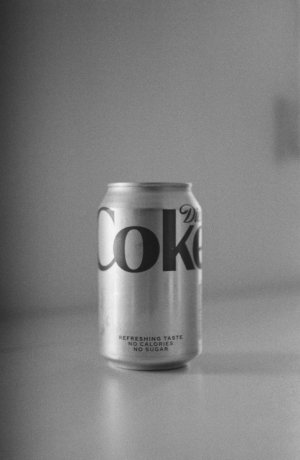Alert: These 3 popular drinks could skyrocket your risk of Alzheimer’s—even the "healthy" ones!
By
Veronica E.
- Replies 0
As we grow older, maintaining a healthy lifestyle becomes more than a goal; it’s a necessity. We diligently read labels, replace sugar with artificial sweeteners, and choose beverages marketed as healthful.
But what if some of these seemingly smart choices are stealthily undermining our brain health?
The truth might be hard to swallow, but today we’re uncovering how three popular drinks could significantly increase your risk of Alzheimer’s disease.
Brace yourself — some of these might already be in your fridge!

Picture this: health-conscious individuals reaching for a can of diet soda, reveling in its zero-calorie promise. While it may seem like a guilt-free indulgence, the hidden cost to brain health is alarming.
Diet sodas are often sweetened with aspartame, an artificial sweetener linked to negative effects on gut bacteria.
Why does this matter? The gut-brain axis — the communication highway between your gut and brain — plays a crucial role in overall health.
Disruption to gut flora caused by aspartame can lead to inflammation, a condition that affects not just your body but also your brain.
In 2024, a committee within the World Health Organization (WHO) classified aspartame as “possibly carcinogenic to humans.” While this classification has faced pushback from industry experts, its potential risks to brain health remain concerning.
The combination of gut flora disruption and inflammation may pave the way for neurodegenerative diseases like Alzheimer’s.

The debate surrounding alcohol and health is nothing new, but when it comes to brain health, the message is clear: proceed with caution.
Alcohol consumption, particularly in excessive amounts, interferes with Slow-wave sleep (SWS), the deep restorative sleep phase essential for brain repair and memory consolidation.
Research reveals that even a 1% annual loss in SWS could increase dementia risk by 27%. Beyond sleep disruption, alcohol can contribute to obesity, which is another significant risk factor for Alzheimer’s and other neurodegenerative diseases.
Dr. Arjun Masurkar, a cognitive neurologist and dementia specialist at NYU Langone Health, advises those over 65 to limit alcohol intake to no more than one drink per day — or none at all for optimal brain health.

Brightly colored and loaded with electrolytes, sports drinks are marketed as the ultimate workout companion. But lurking beneath their vibrant hues is a hefty dose of sugar.
The lack of fiber in sports drinks leads to rapid absorption of sugar, causing spikes in blood glucose and insulin levels.
This chain reaction can contribute to insulin resistance, a condition linked to an increased risk of Alzheimer’s disease.
While these drinks are marketed as rejuvenating and healthful, their high sugar content poses a significant threat to overall health — especially cognitive function.

Now that we’ve poured out the facts about these beverages, it’s time to rethink what’s in your glass. Choosing water, herbal teas, or other low-sugar, non-alcoholic options can help protect your brain health and lower your risk of Alzheimer’s.
Remember, the choices we make today shape the health we’ll have tomorrow. By swapping out these risky beverages for better alternatives, we take a proactive step toward a healthier, sharper mind.

We’d love to hear from you at The GrayVine! Have you made dietary changes that positively impacted your health? Do you have tips for reducing reliance on these risky drinks? Share your journey in the comments below. Together, let’s sip our way to a healthier future.
But what if some of these seemingly smart choices are stealthily undermining our brain health?
The truth might be hard to swallow, but today we’re uncovering how three popular drinks could significantly increase your risk of Alzheimer’s disease.
Brace yourself — some of these might already be in your fridge!

Rethinking your drink choices is key to supporting brain health and reducing the risk of Alzheimer’s. Image Source: Pexels / Ron Lach.
Diet soda: A bitter truth behind the sweetness
Picture this: health-conscious individuals reaching for a can of diet soda, reveling in its zero-calorie promise. While it may seem like a guilt-free indulgence, the hidden cost to brain health is alarming.
Diet sodas are often sweetened with aspartame, an artificial sweetener linked to negative effects on gut bacteria.
Why does this matter? The gut-brain axis — the communication highway between your gut and brain — plays a crucial role in overall health.
Disruption to gut flora caused by aspartame can lead to inflammation, a condition that affects not just your body but also your brain.
In 2024, a committee within the World Health Organization (WHO) classified aspartame as “possibly carcinogenic to humans.” While this classification has faced pushback from industry experts, its potential risks to brain health remain concerning.
The combination of gut flora disruption and inflammation may pave the way for neurodegenerative diseases like Alzheimer’s.

While diet sodas may seem like a healthier choice, their impact on gut health and brain function could surprise you. Image Source: Pexels / Anna Holodna.
Alcohol: The intoxicating path to cognitive decline
The debate surrounding alcohol and health is nothing new, but when it comes to brain health, the message is clear: proceed with caution.
Alcohol consumption, particularly in excessive amounts, interferes with Slow-wave sleep (SWS), the deep restorative sleep phase essential for brain repair and memory consolidation.
Research reveals that even a 1% annual loss in SWS could increase dementia risk by 27%. Beyond sleep disruption, alcohol can contribute to obesity, which is another significant risk factor for Alzheimer’s and other neurodegenerative diseases.
Dr. Arjun Masurkar, a cognitive neurologist and dementia specialist at NYU Langone Health, advises those over 65 to limit alcohol intake to no more than one drink per day — or none at all for optimal brain health.

Excessive alcohol consumption can disrupt sleep patterns and contribute to cognitive decline, increasing the risk of dementia. Image Source: Pexels / Isabella Mendes.
Sports drinks: A sugary foe in disguise
Brightly colored and loaded with electrolytes, sports drinks are marketed as the ultimate workout companion. But lurking beneath their vibrant hues is a hefty dose of sugar.
The lack of fiber in sports drinks leads to rapid absorption of sugar, causing spikes in blood glucose and insulin levels.
This chain reaction can contribute to insulin resistance, a condition linked to an increased risk of Alzheimer’s disease.
While these drinks are marketed as rejuvenating and healthful, their high sugar content poses a significant threat to overall health — especially cognitive function.

Packed with sugar, energy drinks can cause blood sugar spikes, leading to insulin resistance—a potential risk factor for Alzheimer’s. Image Source: Pexels / Ketut Subiyanto.
Now that we’ve poured out the facts about these beverages, it’s time to rethink what’s in your glass. Choosing water, herbal teas, or other low-sugar, non-alcoholic options can help protect your brain health and lower your risk of Alzheimer’s.
Remember, the choices we make today shape the health we’ll have tomorrow. By swapping out these risky beverages for better alternatives, we take a proactive step toward a healthier, sharper mind.
Key Takeaways
- Diet sodas, often considered a "healthy" alternative, contain aspartame, an artificial sweetener that may be toxic to gut bacteria and potentially affect brain health.
- The classification of aspartame as "possibly carcinogenic to humans" by a WHO committee has been contested by industry experts.
- Alcohol consumption may disrupt deep sleep, contribute to obesity, and increase the risk of dementia. Experts recommend minimal intake, particularly for those over 65.
- Sports drinks are high in sugar and may cause blood glucose spikes, leading to insulin resistance—a known risk factor for Alzheimer’s disease.
We’d love to hear from you at The GrayVine! Have you made dietary changes that positively impacted your health? Do you have tips for reducing reliance on these risky drinks? Share your journey in the comments below. Together, let’s sip our way to a healthier future.






